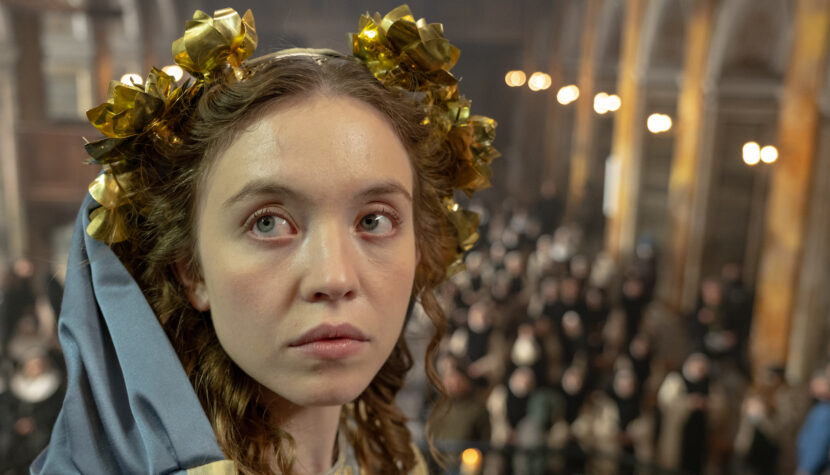IMMACULATE. There are no miracles, but there’s Sweeney [REVIEW]

The history of Christianity is bathed in blood, suffering, and extraordinary dedication from many devoted people within this faith community. One of the most important early Christian martyrs of the Catholic and Orthodox churches is Saint Cecilia. Cecilia was born and lived in the 3rd century in Rome. According to traditions and legends, she was remarkably beautiful. Before entering into marriage with a pagan, she vowed to remain chaste and upheld her vow throughout her life. During Roman persecutions of Christians, when Cecilia was urged to renounce her faith, she endured tortures (including an attempt to “boil” her in a bath), but she remained steadfast. She died from bleeding out after an executioner struck her neck three times with an axe.
Cecilia is also the name of the main character in Michael Mohan’s production, Immaculate. Coincidence? I think not!
Especially since the saint mentioned at the beginning and the film nun portrayed by Sydney Sweeney share quite a lot (primarily virginity). Cecilia in Mohan’s latest film is a young, attractive, and innocent American who believes God has given her another chance at life. As a teenager, she fell through ice into a river and was clinically dead for several minutes due to drowning and hypothermia. After recovering from this traumatic event, Cecilia decided to dedicate her life to God. Because her parish closed unexpectedly, she was unexpectedly invited to take her vows in an Italian convent near Rome. The American novice couldn’t pass up such an opportunity. After all, being a nun in Italy means being even closer to Christ. Soon after Cecilia takes her vows (including vows of chastity), she discovers she is pregnant. Local medical tests indicate that the child she carries is not the result of sexual intercourse. Could it be that God left Sister Cecilia alive so that Jesus Christ could come into the world again through her body?
Leaving the above description of Immaculate without mentioning that it contains a characteristic horror film prologue (a terrifying and cautionary retrospective) would be a mistake and could lead to a situation where some readers of this review might go see Mohan’s film under the impression that they’ll be watching some kind of convent melodrama. Therefore, I warn you: *Immaculate* is a horror film (though I would actually call it a thriller) that doesn’t shy away from violence. Surprisingly, there’s quite a bit of broken bones, torn fingernails, cracked skulls, and liters of blood. Many horror film fans will surely be excited. Since Immaculate contains gore elements and is set in Italy, you might be reminded of the term ‘giallo’, right? Excellent! But please calm down, because in reality, Michael Mohan’s production is a blend of many characteristic elements of horror as a genre overall. Immaculate is thus a wink to fans of giallo, but also to fans of slashers, nunsploitation, and even followers of so-called satanic cinema. This combination works quite efficiently on several levels, but fails completely on others. The problem with *Immaculate* lies in its script full of absurd assumptions, which forces viewers to explain many situations for themselves, and secondary characters are treated very neglectfully (especially the absurd main antagonist). Incompleteness wouldn’t be bad if it didn’t lead to further questions that detract from achieving full satisfaction from this short, only 89-minute film screening.

Thanks to his penultimate production (The Voyeurs, 2021), as well as Immaculate, director Michael Mohan appears to audiences as a creator who readily adopts ready-made cinematic formulas and clichés. Of course, there’s nothing wrong with that. However, it’s a shame that this approach yields little that is new or fresh. In the case of this reviewed horror film, its creators thus refer to the previously popular religious iconography within the genre. And although the cinematographer for Immaculate, Elisha Christian, does his best to imbue the film with a stylish atmosphere, we don’t really get anything new beyond that— at least not until the film’s third act. The last approximately 20 minutes of Mohan’s production are a wild ride, surprisingly satisfying, which boosts the final assessment of the entire work by at least one point. Besides the cinematographer, the biggest credit goes to Sydney Sweeney, who in a better film like Immaculate would immediately be hailed as a scream queen. I realize some may feel oversaturated with her presence in recent months, but it’s impossible not to notice that this actress, at just 26 years old, is immensely talented, and her role as Sister Cecilia is further proof of that.
Immaculate is a terribly uneven horror film. It’s as if people at various levels of cinematographic expertise and sensitivity worked on it. It’s a film that wants to address the issue of religious trauma but is too direct; a film that wants to critique Christian misogyny but instead takes it for granted; finally, a film that wants to stand on the side of women regarding their bodily autonomy, but without Sydney Sweeney, this issue probably wouldn’t have resonated (certainly not as loudly).

